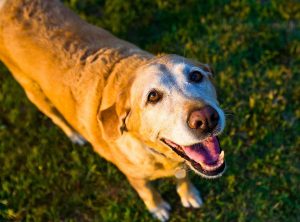 As much as we don’t want to accept it, our dogs age. When a dog is considered a senior depends on the breed and different sized breeds age differently. Other factors that play a role are genetics, nutrition and their environment. Your dog’s needs change as they get older. Here are some things you can do to help your senior pet stay healthy & happy.
As much as we don’t want to accept it, our dogs age. When a dog is considered a senior depends on the breed and different sized breeds age differently. Other factors that play a role are genetics, nutrition and their environment. Your dog’s needs change as they get older. Here are some things you can do to help your senior pet stay healthy & happy.- Regular Vet Check-ups. Vet visits are essential to keeping your senior pup in good shape! It’s much better to prevent disease than treat it. Age-related diseases may develop subtly and be easy to miss. Senior pets may need more frequent trips to the vet in general. If you notice changes in your dog’s behavior, appetite or energy, it’s a good idea to check in with your vet to make sure everything’s okay.
- Choose a Good Diet. Feeding your senior dog a high quality diet is crucial to maintaining good health and quality of life. Giving the appropriate amount at meal time is also important because obesity leads to disease or impacts existing conditions. Being overweight can also put more stress on the joints and aggravate arthritis. Your vet can work with you to create a plan that meets your dog’s specific nutritional needs and make recommendations on good supplements to support their health. Your vet may also recommend a specialized diet for certain issues or diseases.
- Walking & Exercise. Exercise is important to keep your senior dog at a healthy weight and helps maintain their joints and muscles. It also slows down the development of arthritis. Walking and swimming are both great, low impact choices for older pups. You can start with short walks and increase the length over time. Provide plenty of water and limit exposure to hot and humid weather. Make sure you also watch for signs that they need a break. Mental stimulation is also beneficial for older dogs—Puzzles and games are a great way to keep your pup’s mind sharp.
- Dental Health. Dental health is extremely important to your dog’s wellbeing. Dental disease can lead to various serious diseases if left untreated. Regular teeth brushing with enzyme toothpaste formulated specifically for dogs is key. If your pet won’t allow teeth brushing, try dental treats or toys that help clean the teeth. Your vet may have other recommendations for your pet’s teeth or may recommend a professional cleaning if they are in good enough health.
- Special Accommodations. Remember, your senior pet has different needs than your other pups. Simple things like providing comfier bedding, putting rugs on hard floors to make walking easier, or even ramps around the house make a big difference in the life of your senior pet!
Senior pets have so much love to give. We absolutely love our senior guests and do our best to make their time at Pampered Pets Inn enjoyable and relaxing. With some proactive steps at home, you can make sure your pup has a long and healthy life.

